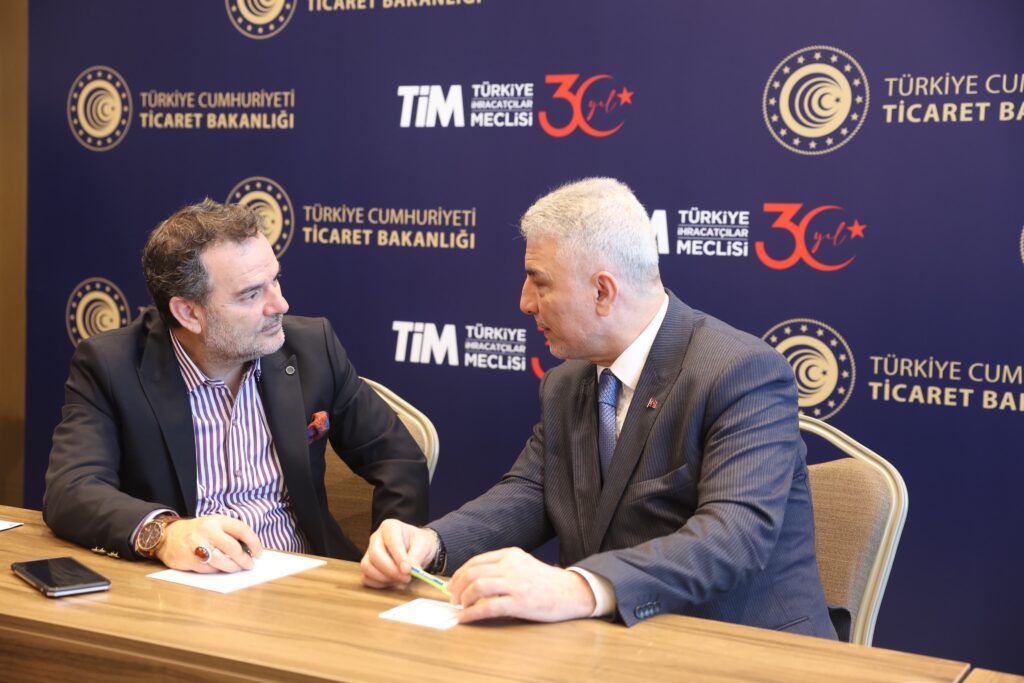A recent interview given by Turkey’s trade minister is seen by critics as a desperate attempt to deal with the fallout from an investigative journalist’s reports that exposed the extent of Turkey’s trade with Israel and ongoing shipments by pro-government companies, contradicting Ankara’s strident anti-Israel rhetoric during the ongoing Gaza conflict.
After Palestinian militant organization Hamas launched attacks on southern Israel from the Palestinian enclave of Gaza on October 7 that killed 1,200 people and resulted in the taking of 240 hostages, Israel retaliated by pounding Gaza, leading to thousands of civilian casualties.
In an interview published by the Arabic edition of Al Jazeera on Tuesday, Trade Minister Ömer Bolat stated that trade between Turkey and Israel had decreased by more than 50 percent between October 7 and December 4. According to Bolat, this sharp decline is the result of a boycott in Turkey against brands perceived as supporters of Israel, in response to what many see as inhumane actions by Israel.
Turkish citizens and businesses are reacting to the situation and are increasingly halting their sales to Israel and canceling existing orders, Bolat said.
Bolat was criticized for not addressing the trade of companies with links to Turkish President Recep Tayyip Erdoğan, while his interviewer, journalist Kemal Öztürk, who previously headed Turkey’s state-run Anadolu news agency, was accused of asking soft questions and helping Ankara manage the public outcry over the perceived hypocrisy of Turkey’s stance.
Israel’s harsh response to the Hamas attack on October 7 drew criticism from around the globe, while backlash in the Islamic world was particularly pronounced. Turks took to the streets to protest Israel, while vigilante boycotts against pro-Israel companies degenerated into mobs attacking customers for choosing the wrong coffee shop to frequent.
Erdoğan, who long marketed himself in the Muslim world as the champion of Palestinian rights and a strong critic of Israel, was unusually moderate in his tone in the initial days of the conflict and even offered to mediate between the sides.
However, as public outrage grew over the death toll in Gaza, the Turkish president could not afford to remain silent and unleashed harsh rhetoric that has shown no signs of abating, which has culminated in him repeatedly accusing Israel of being a “terrorist state” while praising Hamas as “liberators.”
Investigative journalist Metin Cihan, citing data from open sources, revealed that companies closely linked to Erdoğan continued business with Israel, despite the president branding himself as a champion of the Palestinian cause.
Cihan, on the social media platform X, formerly Twitter, revealed details of shipments from companies linked to the president’s son, Burak Erdoğan, and former prime minister Binali Yıldırım’s son, Erkam Yıldırım.
He also pointed out that companies like Limak Holding, MNG Holding and Kolin Holding, known for securing significant government contracts and their connections to Erdoğan, allegedly engaged in activities such as letting their ports be used for shipments to Israel and providing services to Israeli government tankers.
Cihan, in a detailed post on X, said Bolat’s interview was full of manipulation and evasion. He highlighted the government’s continuation of trade with Israel during the Gaza conflict, including possible supplies to the Israeli military by Turkish companies. Cihan also noted the involvement of Erdoğan and Yıldırım family members in this trade.
Cihan criticized the interview conducted by journalist Öztürk with Bolat, suggesting that the interview was an attempt to manage the fallout after revelations that Turkey continued trading with Israel amid the Gaza conflict.
Cihan highlighted the role of Turkish companies in supplying food, clothing, raw materials, fuel and weapons parts to Israel. He underlined that these revelations were particularly damning, considering Turkey’s outspoken stance against Israel during the Gaza bombings.
He also criticized the interview for its lack of critical questioning of the government’s contradictory position. He noted that while the interview claimed a decrease in trade with Israel, it failed to acknowledge the ongoing business relations between certain Turkish companies and Israel. Cihan argued that such selective reporting and vague statements about private sector involvement served to distract from the government’s tacit approval of these trade relations.
Cihan questioned the journalistic integrity of the interview and the responsibility of the media to hold the government accountable.
Many others on X questioned the interview, emphasizing the lack of critical questions about the involvement of Erdoğan and Yıldırım’s sons in the trade with Israel.
Some, like veteran journalist Bülent Korucu, raised questions about the purported 50 percent drop in trade with Israel, suggesting that if trade by pro-government entities continues, the companies that account for this fall in trade volume must have no business with Erdoğan or the government.
Former Kurdish politician Sıdkı Zilan highlighted the contradiction in Turkey’s labeling of Israel as “a terrorist state” while not applying the financial laws against terrorism in its trade practices.
Israeli ports instructed to remove schedules from web
As journalist Metin Cihan’s research, based on publicly available shipping data, has uncovered ships heading to Israeli ports, Israel’s recent decision to withhold port schedules from websites has prompted comment.
Following attacks by Yemeni militants on ships in the Red Sea en route to Israel, the government instructed the country’s ports to remove information about the arrivals and departures of ships from their websites, according to the Globes news website.
The instruction comes in the wake of Monday afternoon’s attack on Norwegian chemical tanker Strinda, 60 nautical miles north of the Bab al-Mandab Strait, when Iranian-backed Houthi rebels fired a cruise missile at the ship from Yemen. The US military said the attack caused damage but that there were no casualties.
In the context of Turkey, the decision is seen as favorable to companies linked to President Erdoğan. Critics suspect that the lack of publicly available port information will allow these companies to continue their shipments to Israel under limited public scrutiny.

